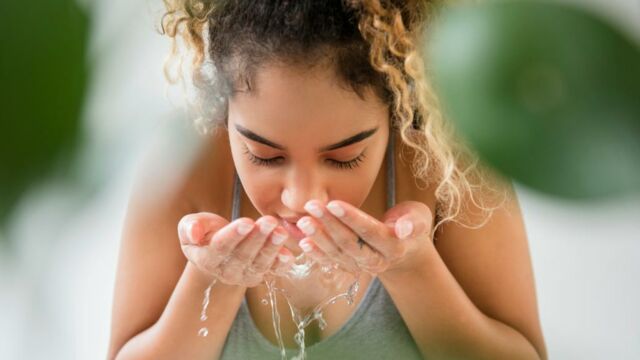Most of us will have suffered an unfortunate acne breakout at least once. While skincare ingredients containing salicylic acid, benzoyl peroxide and niacinamide are usually the best over the counter products to target acne, these products are not the only way to cure it.
Discover our latest podcast
What causes acne?
Four factors typically cause acne:
- An overproduction of sebum
- Inflammation
- The buildup of dead skin cells
- Overproduction of P. acnes bacteria
By changing your daily habits and using natural ingredients, you can target these factors and reduce and cure your acne.
Natural ways to reduce acne
1. Take a zinc supplement
Zinc is an essential supplement for hormone production, cell growth, metabolism and immune function.
Zinc as a solution to acne has been well supported in studies compared to other natural remedies. Some research has even shown that those with acne often have a lower level of zinc in their blood than those with clear skin, and it is more effective at treating inflammatory and severe acne than mild acne.
Taking a zinc supplement may therefore help reduce and prevent some acne. However, it is crucial to stick to zinc’s upper recommended dose of 40mg per day as taking excess zinc can result in some adverse effects.
2. Use tea tree oil as a spot treatment
Tea tree oil is an essential oil known for its anti-bacterial and anti-inflammatory properties.
Previous studies have found that tea tree oil is effective at treating acne. Tea tree oil can be found in many creams and natural-based spot treatments. However, as an essential oil, tea tree oil can be irritating to the skin and should be diluted when used raw.
How to use tea tree oil as a spot treatment:
- Combine 1 part tea tree oil with 9 parts water
- Dip a cotton swab into the mix and apply to desired areas
- Follow up with a moisturiser
3. Use green tea as a skincare ingredient
Thanks to its antioxidant properties, green tea may be great for our insides, but it also has some fantastic benefits to the skin. One antioxidant in green tea known as epigallocatechin-3-gallate (EGCG) has been shown to reduce sebum, fights inflammation and inhibits the production of P. acnes bacteria.
Green tea extract can be found in many skincare products, but you can also make your own green tea toner.
How to make your own green tea toner:
- Steep green tea in boiling water for 3-4 minutes
- Allow the tea to cool
- Use a cotton ball or spritzer to apply the green tea to the face
- Allow the tea to dry and then follow up with a moisturiser
4. Moisturise with aloe vera
Aloe vera is a tropical plant with a clear gel within its leaves that is often used in creams, ointments, soaps and even burn relief gels.
Aloe vera is often used to treat burns, abrasions, skin conditions and even inflammation. Studies have also shown that when used in combination with treatments such as tretinoin or tea tree oil, aloe vera can help reduce acne.
Aloe vera also contains salicylic acid and sulfur, both of which are used to treat acne.
To use aloe vera on your acne, you can seek aloe vera based skincare products, or you can peel an aloe leaf and use the gel raw. If you choose to DIY your aloe vera gel, then it’s best to patch test it first in case of irritation or contact dermatitis.
5. Reduce dairy and foods with a high glycemic load
While the connection between food and acne is controversial, some people have found that cutting out dairy or foods with a high glycemic index have improved their acne.
Milk and dairy products contain the hormone IGF-1, which has previously been associated with acne.
Previous small studies have suggested that those who consume a high amount of dairy are more likely to have severe acne. On the other hand, a large study involving 20,000 people found no connection between acne and milk consumption. While further research is needed, it may be worth cutting back on dairy and seeing if your skin improves.
Foods with a high glycemic load can cause an insulin spike which can, in turn, create an overproduction of sebum. As a result, reducing the consumption of high glycemic index foods may help to reduce acne.
Previous small studies have shown that reducing the consumption of high glycemic load products can reduce acne, but more extensive studies are still needed.
High glycemic foods include:
- Sugary cereals and snacks
- White bread
- Cakes, doughnuts and pastries
- Candy
- Sugary soft drinks
Low glycemic index foods include:
- Whole grains
- Fruits
- Vegetables
- Legumes
- Nuts
6. Reduce stress
Hormones released during stressful periods may increase sebum and inflammation, which can worsen acne. High stress can also delay skin healing which can slow the repair of acne lesions.
Multiple studies have found a link between acne and stress. However, these studies were small and more significant ones are needed for more conclusive findings.
Stress-relieving techniques may help to ease acne. If you feel like stress may be behind your breakouts, try integrating the following things into your routine:
- More sleep
- Yoga
- Meditation
- Daily exercise
- Regular physical activity
7. Exercise regularly
There is little evidence between regular exercise and acne. However, exercise can increase circulation to nourish skin cells which can result in a reduction of acne. Exercise also plays a role in hormone regulation.
Several studies have also found a connection between exercise and stress relief which also contributes to acne reduction.
The NHS recommends adults get 150 minutes of moderate-intensity exercise or 75 minutes of vigorous-intensity exercise per week.















